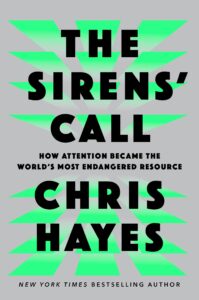For a long time, I’ve been obsessed with what it feels like to use too much tech. My mind grows jittery and anxious, like my consciousness has been shredded. I’m ripped between pings and memes and targeted ads, fighting—and then succumbing to—the overwhelming desire to scroll. It makes me feel awful. The things I once found beautiful escape my notice, become ghosts at the periphery of a screen. In a deep way, I feel estranged from myself whenever I’m on my phone. I still use it four or five hours a day.
 In Chris Hayes’s new book, The Sirens’ Call, he writes that a defining aspect of contemporary existence is “a feeling that our very interior life, the direction of our thoughts, is being taken against our will.” He blames the tech companies, whose whole economic model is resource extraction—like Exxon pulls oil from the ground, YouTube mines our attention. But attention, Hayes writes, is not merely a commodity; it’s the substance of human life. It’s literally the medium of our consciousness. Our whole existence consists of a series of things we pay attention to, either because we’ve chosen to attend to them, or because our attention has been irresistibly compelled.
In Chris Hayes’s new book, The Sirens’ Call, he writes that a defining aspect of contemporary existence is “a feeling that our very interior life, the direction of our thoughts, is being taken against our will.” He blames the tech companies, whose whole economic model is resource extraction—like Exxon pulls oil from the ground, YouTube mines our attention. But attention, Hayes writes, is not merely a commodity; it’s the substance of human life. It’s literally the medium of our consciousness. Our whole existence consists of a series of things we pay attention to, either because we’ve chosen to attend to them, or because our attention has been irresistibly compelled.
Attention, Hayes argues, is now the world’s most valuable resource; “those who successfully extract it command fortunes, win elections, and topple regimes.” That observation isn’t new—the attention economy has been the subject of an array of splashy recent books—but The Sirens’ Call stands out for its bombastic argument that we’re currently experiencing an economic upheaval on the scale of the Industrial Revolution. Just as industrial capitalism transfigured work into a commodity called “labor” (allowing a person’s time and effort to be sold on the market for a wage), tech companies have commodified attention, transforming human consciousness into economic units of engagement and clicks. To 18th-century workers, this new system of wage labor felt bad. It was “alienating,” in the parlance of Marx. This was a foundational insight, Hayes writes: that this new economic regime would “coercively extract something from people that had previously, in a deep sense, been theirs.”
Where Marx described alienated workers, Hayes writes of alienated users. That’s why we feel so besieged, he says, why tech saturation feels so bad. Our minds are being targeted with increasing urgency and sophistication by a noxious proliferation of devices and feeds whose sole purpose is to rip us from the things we value (our families and friends, our hobbies and passions) and redirect us toward content that’s profitable (political outrage, salacious misinformation, videos of strangers unboxing things they’ve bought).
The appetite for our eyeballs is bottomless—our attention enriches CEOs and empowers politicians—but what have we gotten in return? Across the globe, people are lonelier and angrier, more fractious and polarized. Our information ecosystem is so polluted that it’s nearly impossible to discern what’s true. We live in a state of constant bombardment, numbed by, as Hayes puts it, “a pendulating wall of sound that is now the room tone of our collective mental lives.” It leaves us vulnerable and depleted. And to escape our diminished selves, we scroll.
For years, my feeds have been carnivals of clickbait and memes and sponcon and soundbites. I understand why; “In competitive attention markets,” Hayes writes, “amusement will outcompete information, and spectacle will outcompete arguments.” But it’s literally making us dumber. Hayes believes that the complexity of our thinking is “determined to a large degree by the sophistication of the language we hear used to describe our world.” Lately, I’m awash in screenshots from Truth Social and 15-second clips of pundits reacting to Trump.
And what if I prefer something richer? What if I want to spend my time—and therefore my life—on things that are nourishing, that make me feel like myself? The attention economy has become so rapacious, has colonized so many nooks of our lives, that protecting our consciousness now requires monkish self-discipline or disturbingly byzantine hacks: Yondr pouches, phone jails, screentime restriction apps, luxury devices that deliberately lack all the features we crave. Last fall, I literally spent two days at a monastery to get myself away from my phone. All of this, just to wrest back scraps of attention, something that was once mostly ours.
The Sirens’ Call is a provocative book, readable and well-argued and alarming. Hayes thinks that “even the most panicked critics” of tech haven’t yet reckoned with the full breadth of its disruption, with the vast transformation it has wrought on both our public and inner lives. The book takes big swings—at political and economic regimes—but it’s also quite intimate. Reading it, I thought a lot about my son. Before we adopted him, he had an internet addiction so fierce that he’d sneak out of bed to watch YouTube on his foster parents’ smart fridge. And when he came to us, we took away most of his tech. I feel vexed about that; I worry that I’m estranging him from the zeitgeist, forcing distance between him and his peers. But in the end, I think it’s better than estranging him from himself.
One of our most precious human gifts, I think, is the ability to find our own company engaging, to feel at ease alone in our minds. I don’t want my son’s consciousness in the custody of Google and Meta and ByteDance and Apple; I want it to belong to him.



















